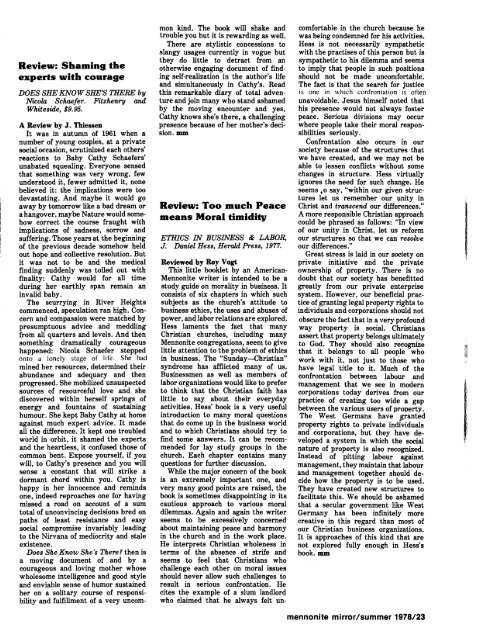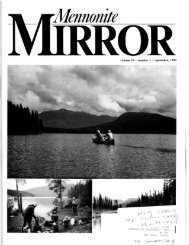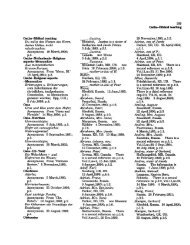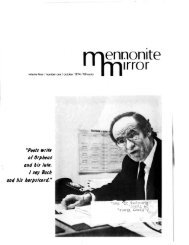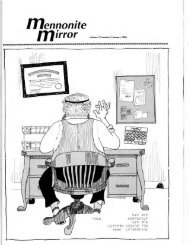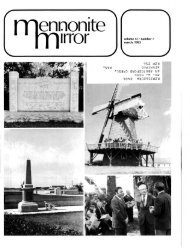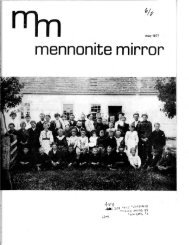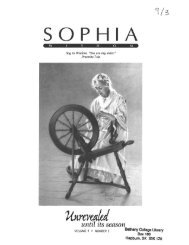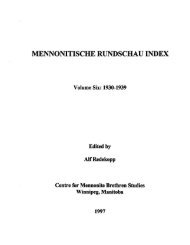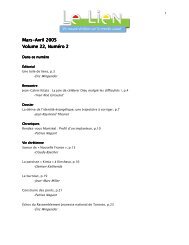ennonite - Canadian Conference of Mennonite Brethren Churches
ennonite - Canadian Conference of Mennonite Brethren Churches
ennonite - Canadian Conference of Mennonite Brethren Churches
Create successful ePaper yourself
Turn your PDF publications into a flip-book with our unique Google optimized e-Paper software.
Review: Shaming the<br />
e.perts with courage<br />
DOES SHE KNOW SHE'S THERE by<br />
Nicola Schaefer. Fitzhenry and<br />
Whiteside, $9.95.<br />
A Review by J. ThiesSen<br />
It was in autumn <strong>of</strong> 1961 when a<br />
number <strong>of</strong> young couples, at a private<br />
social occasion, scrutinized each others'<br />
reactions to Baby Cathy Schaefers'<br />
unabated squealing. Everyone sensed<br />
that something :was very wrong, few<br />
understood it, fewer admitted it, none<br />
believed it: the implications were too<br />
devastating. And maybe it would go<br />
away by tomorrow like a bad dream or<br />
a hangover, maybe Nature would somehow<br />
correct the course fraught with<br />
implications <strong>of</strong> sadness, sorrow and<br />
suffering. Those years at the beginning<br />
<strong>of</strong> the previous decade somehow held<br />
out hope and collective resolution. But<br />
it was not to be and the medical<br />
finding suddenly was tolled out with<br />
finality: Cathy would for all time<br />
during her earthly span remain an<br />
invalid baby.<br />
The scurrying in River Heights<br />
commenced, speculation ran high. Concern<br />
and compassion were matched by<br />
presumptuo~s advice and meddling<br />
from all quarters and levels. And then<br />
something dramatically courageous<br />
happened: Nicola Schaefer stepped<br />
onto a lonely stage <strong>of</strong> life. She had<br />
mined her resources, determined their<br />
abundance and adequacy and then<br />
progressed. She mobilized unsuspected<br />
sources <strong>of</strong> resourceful love and she<br />
discovered within herself springs <strong>of</strong><br />
energy and fountains <strong>of</strong> sustaining<br />
humour. She kept Baby Cathy at home<br />
against much expert advice. It made<br />
all the difference. It kept one troubled<br />
world in orbit, it shamed the experts<br />
and the heartless, it confused those <strong>of</strong><br />
common bent. Expose yourself, if you<br />
will, to Cathy's presence and you will<br />
sense a constant that will strike a<br />
dormant chord within you. Cathy is<br />
happy in her innocence and reminds<br />
one, indeed reproaches one for having<br />
missed a road on account <strong>of</strong> a sum<br />
total <strong>of</strong> unconvincing decisions bred on<br />
paths <strong>of</strong> least resistance and easy<br />
social Compromise invariably leading<br />
to the Nirvana <strong>of</strong> mediocrity and stale<br />
existence.<br />
Does She Know She's There? then is<br />
a moving document <strong>of</strong> and by a<br />
courageous and loving mother whose<br />
wholesome intelligence and good style<br />
and enviable sense <strong>of</strong> humor sustained<br />
her on a solitary course <strong>of</strong> responsibility<br />
and fulfillment <strong>of</strong> a very uncommon<br />
kind. The book will shake and<br />
trouble you but it is rewarding as well.<br />
There are stylistic concessions to<br />
slangy usages currently in vogue but<br />
they do little to detract from an<br />
otherwise engaging document <strong>of</strong> finding<br />
self-realization in the author's life<br />
and simultaneously in Cathy's. Read<br />
this remarkable diary <strong>of</strong> total adventure<br />
and join many who stand ashamed<br />
by the moving encounter and yes,<br />
Cathy knows she's there, a challenging<br />
presence because <strong>of</strong> her mother's decision.<br />
mm<br />
Review: Too much Peace<br />
means Moral timidity<br />
ETHICS IN BUSINESS & LABOR,<br />
J. Daniel Hess, Herald Press, 1977.<br />
Reviewed by Roy Vogt<br />
This little booklet by an American<br />
M<strong>ennonite</strong> writer is intended to be a<br />
study guide on morality in business. It<br />
consists <strong>of</strong> six chapters in which such<br />
subjects as the church's attitude to<br />
business ethics, the uses and abuses <strong>of</strong><br />
power, and labor relations are explored.<br />
Hess laments the fact that many<br />
Christian churches, including many<br />
M<strong>ennonite</strong> congregations, seem to give<br />
little attention to the problem <strong>of</strong> ethics<br />
in business. The "Sunday-Christian"<br />
syndrome has afflicted many <strong>of</strong> us.<br />
Businessmen as well as members <strong>of</strong><br />
labor organizations would like to prefer<br />
to think that the Christian faith has<br />
little to say about their everyday<br />
activities. Hess' book is a very useful<br />
introduction to many moral questions<br />
that do come up in the business world<br />
and to which Christians should try to<br />
find some answers. It can be recommended<br />
for lay study groups in the<br />
church. Each chapter contains many<br />
questions for further discussion.<br />
While the major ~ncern <strong>of</strong> the book<br />
is an extremely important one. and<br />
very many good points are raised, the<br />
book is sometimes disappointing in its<br />
cautious approach to various moral<br />
dilemmas. Again and again the writer<br />
seems to be excessively concerned<br />
about maintaining peace and harmony<br />
in the church and in the work place.<br />
He interprets Christian wholeness in<br />
terms <strong>of</strong> the absence <strong>of</strong> strife and<br />
seems to feel that Christians who<br />
challenge each other on moral issues<br />
should never allow such challenges to<br />
result in serious confrontation. He<br />
cites the example <strong>of</strong> a slum landlord<br />
who claimed that he always felt uncomfortable<br />
in the church because he<br />
was being condemned for his activities.<br />
Hess is not necessarily sympathetic<br />
with the practises <strong>of</strong> this person but is<br />
sympathetic to his dilemma and seems<br />
to imply that people in such positions<br />
should not be made uncomfortable.<br />
The fact is that the search for justice<br />
is one in which confrontation is <strong>of</strong>ten<br />
unavoidable. Jesus himself noted that<br />
his presence would not always foster<br />
peace. Serious divisions may occur<br />
where people take their moral responsibilities<br />
seriously.<br />
Confrontation also occurs in our<br />
society because <strong>of</strong> the structures that<br />
we have created, and we may not be<br />
able to lessen conflicts without some<br />
changes in structure. Hess virtually<br />
ignores the need for such change. He<br />
seems to say, "within our given structures<br />
let us remember our unity in<br />
Christ and transcend our differences."<br />
A more responsible Christian approach<br />
could be phrased as follows: "In view<br />
<strong>of</strong> our unity in Christ, let us reform<br />
our structures so that we can resolve<br />
our differences."<br />
Great stress is laid in our society on<br />
private initiative and the private<br />
ownership <strong>of</strong> property. There is no<br />
doubt that our society has benefitted<br />
greatly from our private enterprise<br />
system. However, our beneficial practice<br />
<strong>of</strong> granting legal property rights to<br />
individuals and corporations should not<br />
obscure the fact that in a very pr<strong>of</strong>ound<br />
way property is social. Christians<br />
assert that property belongs ultimately<br />
to God. They should also recognize<br />
that it belongs to all people who<br />
work with it, not just to those who<br />
have legal title to it. Much <strong>of</strong> the<br />
confrontation between labour and<br />
management that we see in modern<br />
corporations today derives from our<br />
practice <strong>of</strong> creating too wide a gap<br />
between the various users <strong>of</strong> property.<br />
The West Germans have panted<br />
property rights to private individuals<br />
and corporations, but they have developed<br />
a system in which the social<br />
nature <strong>of</strong> property is ~so recognized.<br />
Instead <strong>of</strong> pitting labour against<br />
management, they maintain that labour<br />
and management together should decide<br />
how the property is to be used.<br />
They have created new structures to<br />
facilitate this. We should be ashamed<br />
that a secular government like West<br />
Germany has been infinitely more<br />
creative in this regard than most <strong>of</strong><br />
our Christian business organizations.<br />
It is approaches <strong>of</strong> this kind that are<br />
not explored fully enough in Hess's<br />
book.mm<br />
m<strong>ennonite</strong> mirror/summer 1978/23


